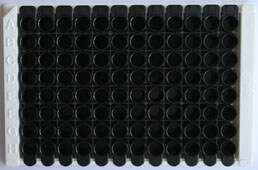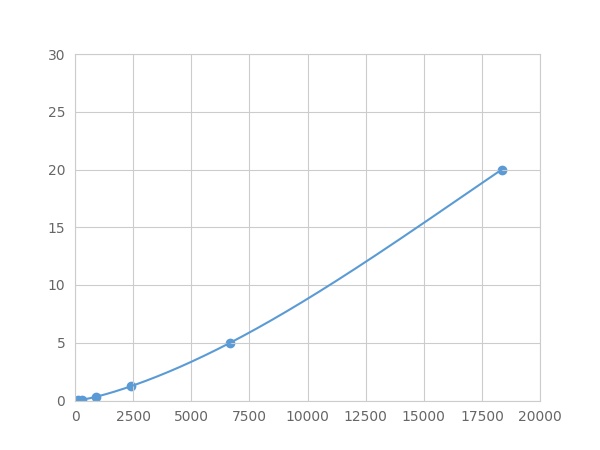Packages (Simulation)

Reagent Preparation

Image (I)
Image (II)
Certificate


Multiplex Assay Kit for Occludin (OCLN) ,etc. by FLIA (Flow Luminescence Immunoassay)
Tight Junction Protein Occludin TM4 Minus
(Note: Up to 8-plex in one testing reaction)
- Product No.LMC228Ra
- Organism SpeciesRattus norvegicus (Rat) Same name, Different species.
- Sample TypeTissue homogenates, cell lysates and other biological fluids
- Test MethodDouble-antibody Sandwich
- Assay Length3.5h
- Detection Range0.02-20ng/mL
- SensitivityThe minimum detectable dose of this kit is typically less than 0.007 ng/mL.
- DownloadInstruction Manual
- UOM 8Plex 7Plex 6Plex 5Plex 4Plex 3Plex 2Plex1Plex
- FOB
US$ 474
US$ 492
US$ 520
US$ 556
US$ 593
US$ 648
US$ 730
US$ 912
Add to Price Calculator
Result
For more details, please contact local distributors!
Specificity
This assay has high sensitivity and excellent specificity for detection of Occludin (OCLN) ,etc. by FLIA (Flow Luminescence Immunoassay).
No significant cross-reactivity or interference between Occludin (OCLN) ,etc. by FLIA (Flow Luminescence Immunoassay) and analogues was observed.
Recovery
Matrices listed below were spiked with certain level of recombinant Occludin (OCLN) ,etc. by FLIA (Flow Luminescence Immunoassay) and the recovery rates were calculated by comparing the measured value to the expected amount of Occludin (OCLN) ,etc. by FLIA (Flow Luminescence Immunoassay) in samples.
| Matrix | Recovery range (%) | Average(%) |
| serum(n=5) | 95-104 | 101 |
| EDTA plasma(n=5) | 94-105 | 102 |
| heparin plasma(n=5) | 81-91 | 87 |
| sodium citrate plasma(n=5) | 79-103 | 98 |
Precision
Intra-assay Precision (Precision within an assay): 3 samples with low, middle and high level Occludin (OCLN) ,etc. by FLIA (Flow Luminescence Immunoassay) were tested 20 times on one plate, respectively.
Inter-assay Precision (Precision between assays): 3 samples with low, middle and high level Occludin (OCLN) ,etc. by FLIA (Flow Luminescence Immunoassay) were tested on 3 different plates, 8 replicates in each plate.
CV(%) = SD/meanX100
Intra-Assay: CV<10%
Inter-Assay: CV<12%
Linearity
The linearity of the kit was assayed by testing samples spiked with appropriate concentration of Occludin (OCLN) ,etc. by FLIA (Flow Luminescence Immunoassay) and their serial dilutions. The results were demonstrated by the percentage of calculated concentration to the expected.
| Sample | 1:2 | 1:4 | 1:8 | 1:16 |
| serum(n=5) | 97-104% | 82-97% | 88-96% | 98-105% |
| EDTA plasma(n=5) | 84-101% | 95-103% | 93-101% | 94-105% |
| heparin plasma(n=5) | 78-101% | 93-101% | 79-92% | 93-102% |
| sodium citrate plasma(n=5) | 97-105% | 85-99% | 91-101% | 83-94% |
Stability
The stability of kit is determined by the loss rate of activity. The loss rate of this kit is less than 5% within the expiration date under appropriate storage condition.
To minimize extra influence on the performance, operation procedures and lab conditions, especially room temperature, air humidity, incubator temperature should be strictly controlled. It is also strongly suggested that the whole assay is performed by the same operator from the beginning to the end.
Reagents and materials provided
| Reagents | Quantity | Reagents | Quantity |
| 96-well plate | 1 | Plate sealer for 96 wells | 4 |
| Pre-Mixed Standard | 2 | Standard Diluent | 1×20mL |
| Pre-Mixed Magnetic beads (22#:OCLN) | 1 | Analysis buffer | 1×20mL |
| Pre-Mixed Detection Reagent A | 1×120μL | Assay Diluent A | 1×12mL |
| Detection Reagent B (PE-SA) | 1×120μL | Assay Diluent B | 1×12mL |
| Sheath Fluid | 1×10mL | Wash Buffer (30 × concentrate) | 1×20mL |
| Instruction manual | 1 |
Assay procedure summary
1. Preparation of standards, reagents and samples before the experiment;
2. Add 100μL standard or sample to each well,
add 10μL magnetic beads, and incubate 90min at 37°C on shaker;
3. Remove liquid on magnetic frame, add 100μL prepared Detection Reagent A. Incubate 60min at 37°C on shaker;
4. Wash plate on magnetic frame for three times;
5. Add 100μL prepared Detection Reagent B, and incubate 30 min at 37°C on shaker;
6. Wash plate on magnetic frame for three times;
7. Add 100μL sheath solution, swirl for 2 minutes, read on the machine.
GIVEAWAYS
INCREMENT SERVICES
| Magazine | Citations |
| Brain Research | HIV-1 Tat protein increases the permeability of brain endothelial cells by both inhibiting occludin expression and cleaving occludin via matrix metalloproteinase-9 ScienceDirect: S0006899311021408 |
| Plos one | Disruption of the Circadian Clock in Mice Increases Intestinal Permeability and Promotes Alcohol-Induced Hepatic Pathology and Inflammation PubMed: PMC3688973 |
| Journal of Neurotrauma | A new panel of blood biomarkers for the diagnosis of mild traumatic brain injury/concussion in adults PubMed: 25794137 |
| United States Patent Application | Methods for Diagnosis and Treatment of Concussion or Brain Injury 2016:0103140 |
| Sci Rep. | Blood Occludin Level as a Potential Biomarker for Early Blood Brain Barrier Damage Following Ischemic Stroke articles:srep40331 |
| Frontiers in Pharmacology | Traditional Herbal Medicine-Derived Sulforaphene LFS-01 Reverses Colitis in Mice by Selectively Altering the Gut Microbiota and Promoting Intestinal … Pubmed:29375374 |
| Thorax | Fas activation alters tight junction proteins in acute lung injury Pubmed: 30385692 |
| Antioxidants (Basel). | The Effect of Dietary Quercetin on the Glutathione Redox System and Small Intestinal Functionality of Weaned Piglets Pubmed: 31426309 |
| DISEASE MARKERS | Peripheral blood occludin level as a biomarker for preoperative cerebral edema in patients with brain tumors Pubmed: 32884584 |
| Burns Open | Intestinal Permeability in Participants With Thermal Injury: A Case Series From a Prospective, Longitudinal Study (HESTIA) |
| PLoS One | A comparison of the effects of monotherapy with rosuvastatin, atorvastatin or ezetimibe versus combination treatment with rosuvastatin-ezetimibe and … 34492054 |
| CNS Neuroscience & Therapeutics | Higher serum occludin after successful reperfusion Is associated with early neurological deterioration Pubmed:35338575 |
| Impact de l'incorporation d'acides gras à chaine moyenne, de suppléments de levures et d'avoine nue sur la santé intestinale ainsi que sur la consommation … |
| Catalog No. | Related products for research use of Rattus norvegicus (Rat) Organism species | Applications (RESEARCH USE ONLY!) |
| RPC228Ra01 | Recombinant Occludin (OCLN) | Positive Control; Immunogen; SDS-PAGE; WB. |
| PAC228Ra01 | Polyclonal Antibody to Occludin (OCLN) | WB; IHC; ICC; IP. |
| MAC228Ra21 | Monoclonal Antibody to Occludin (OCLN) | WB |
| MAC228Ra23 | Monoclonal Antibody to Occludin (OCLN) | WB |
| MAC228Ra24 | Monoclonal Antibody to Occludin (OCLN) | WB; IHC; ICC; IP. |
| MAC228Ra25 | Monoclonal Antibody to Occludin (OCLN) | WB |
| MAC228Ra26 | Monoclonal Antibody to Occludin (OCLN) | WB |
| MAC228Ra22 | Monoclonal Antibody to Occludin (OCLN) | WB |
| SEC228Ra | ELISA Kit for Occludin (OCLN) | Enzyme-linked immunosorbent assay for Antigen Detection. |
| LMC228Ra | Multiplex Assay Kit for Occludin (OCLN) ,etc. by FLIA (Flow Luminescence Immunoassay) | FLIA Kit for Antigen Detection. |





